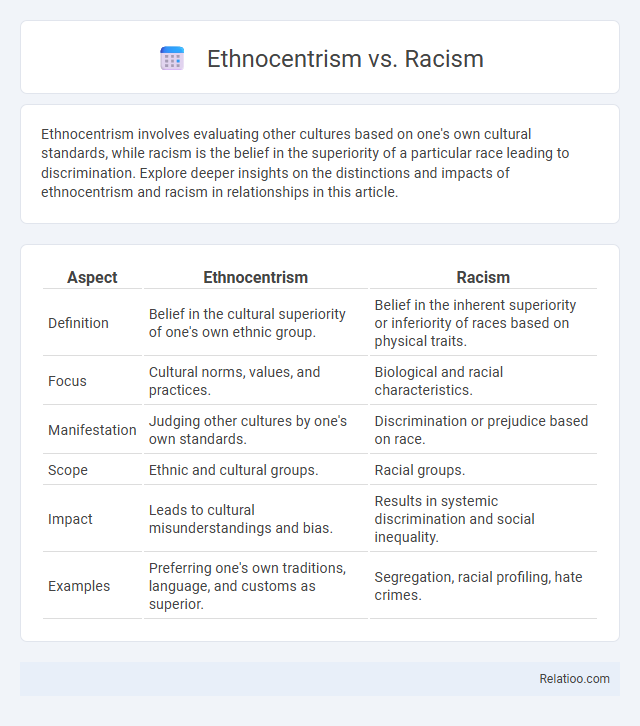Ethnocentrism involves evaluating other cultures based on one's own cultural standards, while racism is the belief in the superiority of a particular race leading to discrimination. Explore deeper insights on the distinctions and impacts of ethnocentrism and racism in relationships in this article.
Table of Comparison
| Aspect | Ethnocentrism | Racism |
|---|---|---|
| Definition | Belief in the cultural superiority of one's own ethnic group. | Belief in the inherent superiority or inferiority of races based on physical traits. |
| Focus | Cultural norms, values, and practices. | Biological and racial characteristics. |
| Manifestation | Judging other cultures by one's own standards. | Discrimination or prejudice based on race. |
| Scope | Ethnic and cultural groups. | Racial groups. |
| Impact | Leads to cultural misunderstandings and bias. | Results in systemic discrimination and social inequality. |
| Examples | Preferring one's own traditions, language, and customs as superior. | Segregation, racial profiling, hate crimes. |
Introduction to Ethnocentrism and Racism
Ethnocentrism involves evaluating other cultures based on the standards and values of one's own culture, often leading to misunderstanding and cultural bias. Racism, by contrast, is the belief in the inherent superiority or inferiority of races, resulting in discrimination and systemic inequality. Understanding these concepts helps you recognize how judgments based on cultural or racial differences impact social interactions and societal structures.
Defining Ethnocentrism
Ethnocentrism is the belief in the inherent superiority of one's own ethnic group or culture, often leading to biased judgments about other groups. Unlike racism, which centers on discriminatory practices based on race, ethnocentrism specifically emphasizes cultural norms, values, and customs. Understanding ethnocentrism is crucial for addressing cultural misunderstandings and promoting social cohesion in diverse societies.
Understanding Racism
Understanding racism involves recognizing it as a systemic belief in racial superiority that enforces discrimination through power structures, unlike ethnocentrism, which centers on cultural or ethnic group bias without necessarily implying power disparities. Racism affects institutions, policies, and social interactions, perpetuating inequality beyond personal prejudice, while ethnocentrism primarily influences how cultural differences are perceived and judged. Your awareness of these distinctions is crucial in addressing social justice and creating inclusive environments.
Key Differences: Ethnocentrism vs Racism
Ethnocentrism is the belief in the inherent superiority of one's own ethnic group or culture, often leading to viewing other cultures through a biased lens. Racism explicitly involves prejudice, discrimination, or antagonism directed against individuals or groups based on their racial identity, often manifesting in systemic inequality. The key difference lies in ethnocentrism emphasizing cultural judgment and preference, while racism centers on hierarchical racial distinctions and power dynamics.
Historical Perspectives on Ethnocentrism and Racism
Historical perspectives on ethnocentrism reveal it as a deep-rooted tendency to view one's own culture as central and superior, influencing social cohesion and intergroup dynamics since ancient civilizations. Racism emerged as a powerful ideology during the colonial era, justifying exploitation and systemic inequality by categorizing people into racial hierarchies based on perceived biological differences. Both concepts reflect socially constructed frameworks that have historically shaped power relations, discrimination, and cultural conflicts across societies worldwide.
Social and Cultural Impacts
Ethnocentrism fosters social division by promoting in-group favoritism and cultural superiority, which can lead to exclusion and discrimination against out-groups. Racism intensifies social inequalities and systemic oppression by attributing inherent inferiority to certain racial groups, resulting in persistent cultural marginalization and limited access to resources. Both ethnocentrism and racism profoundly disrupt social cohesion and cultural diversity, impeding intercultural understanding and equitable societal development.
Manifestations in Society
Ethnocentrism manifests in society through favoritism toward one's cultural group, often resulting in prejudice against others and reinforcing cultural stereotypes. Racism appears as systemic discrimination based on race, leading to unequal opportunities, social exclusion, and institutionalized inequality. Your awareness of these distinctions helps in identifying biased behaviors and promoting inclusivity within diverse communities.
Overcoming Ethnocentrism and Racism
Overcoming ethnocentrism and racism requires fostering cultural awareness, empathy, and inclusive education to challenge biased perspectives and promote respect for diversity. Exposure to diverse cultures and open dialogues about shared human experiences help dismantle prejudices rooted in ethnocentric and racist beliefs. Implementing policies that encourage equity and intercultural understanding is essential to create environments free from discrimination and promote social cohesion.
Case Studies and Real-World Examples
Ethnocentrism manifests in case studies such as the early colonial encounters where European settlers imposed their cultural norms on Indigenous populations, leading to social exclusion and conflict. Racism is exemplified by apartheid in South Africa, highlighting systemic racial discrimination enforced through legal frameworks. Real-world instances of cultural relativism, like the adoption of multicultural policies in Canada, demonstrate efforts to counteract ethnocentric biases by promoting cultural understanding and inclusivity.
Conclusion: Moving Toward Inclusivity
Understanding the distinctions between ethnocentrism, racism, and cultural relativism is crucial for fostering inclusive environments. You can challenge biases by recognizing the inherent value of diverse cultures and actively promoting empathy and respect across social groups. Embracing inclusivity enhances social cohesion and drives positive change in multicultural societies.

Infographic: Ethnocentrism vs Racism
 relatioo.com
relatioo.com